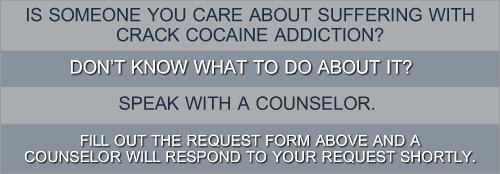
Crack Cocaine Addiction
What Is Crack Cocaine?
Crack cocaine is basically a derivative of cocaine, a drug that is made from the coca plant which is usually found in warm climates. A couple of hundred years ago, cocaine was considered to be a medicine that helped with coughs and throat pain among other things. After a few decades, cocaine began to be seen as an addictive drug that may lead to ruining the user's lives.
Cocaine is a white powder that is usually snorted but can be injected. It is a white powder that does not smell of anything. Crack cocaine is made from this powder and, unlike cocaine, it is usually smoked. Freebase cocaine and it is made by mixing cocaine powder with ammonia and a flammable solvent. Crack cocaine is very similar to freebase cocaine, but it is made in a slightly different way which is a lot less cost prohibitive and less dangerous. Crack is dissolved in baking soda and boiled. Afterwards, the crack is cut into small rocks. These rocks are up to one half a gram in weight and a tan color.
How Is Crack Cocaine Used?
Crack is generally smoked through a pipe but it can also be injected intravenously. The drug is absorbed in a few seconds from the lungs into bloodstream or straight into the bloodstream depending on how the user has taken the drug. When crack goes into the bloodstream, the chemicals attach themselves to the dopamine transmitters in the user's brain and causes the user to experience intense euphoria and feelings of pleasure. This intense high can last for up to fifteen minutes but generally only lasts for about five. Users may go on binges where they re-dose to make sure that they constantly achieve this high. That is why, in some cases, crack cocaine users may disappear. This is similar to that behavior which can be encountered in users of crystal meth.
What Are The Signs of Crack Cocaine Use?
There are many signs that indicate a person might be under the influence of crack cocaine at that moment in time. The user will have glassy and enlarged pupils. Other symptoms of crack cocaine use can occur at any time, even when the user has not taken the drug. They include dramatic and sudden weight loss, heavy and unexplained sweating, a strange and erratic appetite in which the user might not eat a lot for an inordinate amount of time and end up binging on food, dramatic mood swings and depression, anger and paranoia. Users might also experience a feeling of increased self-confidence that can come across as arrogance and bragging to non-users around them.
Is Crack Cocaine Really That Addictive?
Cocaine is a very psychologically addictive drug. Although it cannot be considered physically addictive, users are very likely to end up dependent on the drug. Crack is considered a more addictive substance due to the fact that it goes straight into the brain and can be easily smoked. Additionally, crack is a more accessible substance to those that live in disadvantaged or urban areas. This means that users might not be discouraged by the difficulty to get it due to its illegality.
Users are also likely to quickly develop something called tolerance. This basically means that they are not able to achieve the same feeling that they would when they first started to use the drug so more of the substance needs to be used for users to achieve the same high.
What Are The Signs of Crack Addiction?
Like with any other addiction, the use of crack cocaine must greatly interfere with the user's life and the user must crave crack or feel like he or she needs it to get through their life. These are just some of the symptoms of addiction, a health problem that can truly affect the user's life to a point that makes it unrecognizable.
When the user is not taking crack cocaine, he or she might appear stressed, unsettled, paranoid and anxious. The user might crave the crack cocaine as a way to get over these withdrawal symptoms. Although crack cocaine is not strictly physically addictive, cocaine is one of the most psychologically addictive drugs in the world and crack cocaine is a more potent form of this particular drug which means that this substance is even more addictive than most other drugs.
Some of the signs of crack cocaine addiction have already been mentioned above and can include the immediate and non-immediate signs of crack use. Other signs of crack cocaine addiction may be slipping standards in hygiene and a strange and unexplainable need for money. The user might start stealing from close ones or pawn off items that might be of value. Financial responsibilities like rent and student loan payments may be put off indefinitely.
Users might also completely change their routine and their social circle. The user might skip days of work or school or take time off constantly. Depending on the stage that the addiction is at, the user might skip these responsibilities altogether.
Any changes in routine should be closely observed if you suspect that a loved one might be addicted to crack cocaine. Another sign might be drug paraphernalia that might not be immediately evident to non-users like baking powder and matches.
Users of crack cocaine are at risk of contracting HIV and other sexually transmitted diseases. Crack cocaine users are also at risk of getting hepatitis. Women who use crack while pregnant can greatly affect the neurological and physical development of the fetus, particularly in the first trimester of the pregnancy. These babies may go on to have developmental problems including language and socialization problems when they grow a little bit older. Crack cocaine is a big problem for urban communities that can affect anyone, whether they are users of crack or simply non-users surrounding them as family, friends or part of their community.
If someone you love may be addicted to crack cocaine seek the help of a mental health professional that has experience dealing with addiction treatment and recovery.
- Questions?
